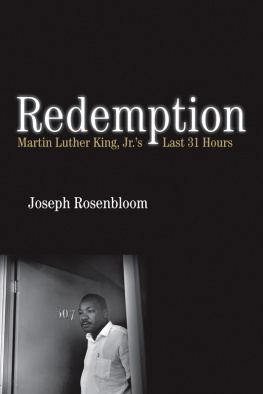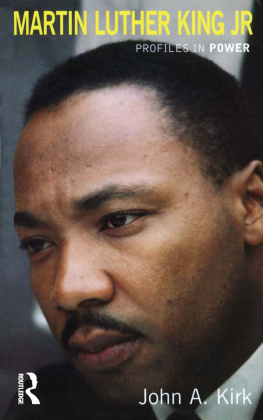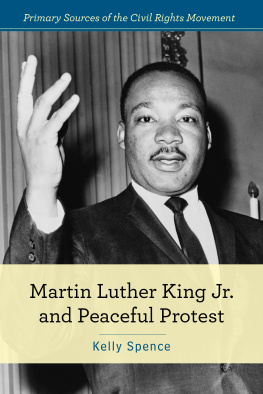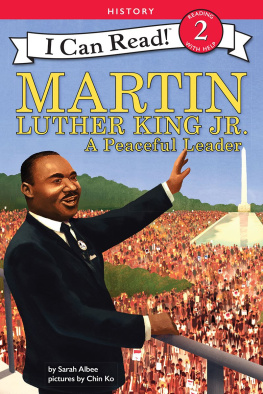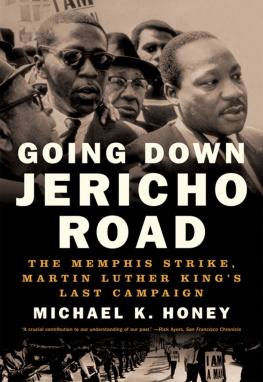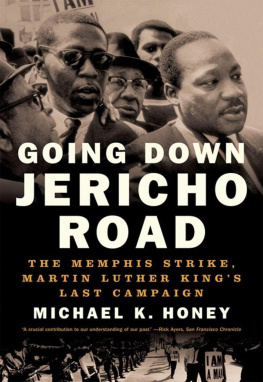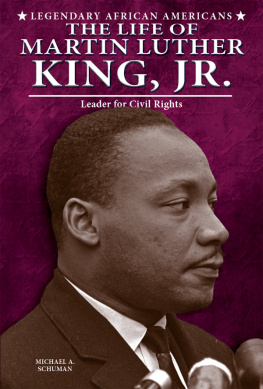Praise for Redemption
Im a Martin Luther King Jr. devotee. When I was a boy growing up in the South in his wake, this Southern black man of towering intellect, soaring oratory, and piercing moral clarity was to me a beacon in the darkness, a template for a life lived with purpose. I still cant get enough of reading about him. So I recommend Redemption, by Joseph Rosenbloom. The granular detail of this slender volume is immersive, humanizing, and demystifying.
CHARLES BLOW , The New York Times
In this gripping account of the King assassination, Joseph Rosenbloom does more than recover the story of the hours leading up to that fateful shot at the Lorraine Motel in Memphis, April 1968. Writing with the urgency of a journalists pen, Rosenbloom melts time away to redeem the fully human struggle of a man, a leader, under enormous pressure, risking his reputation and his life, trying to answer the question, Where do we go from here? The result is not only an absorbing narrative of what happened; it offers readers a chance to reflect on what might have been.
HENRY LOUIS GATES JR. ,
Alphonse Fletcher University Professor,
Harvard University
A compelling and meticulously researched account by investigative journalist Joseph Rosenbloom, Redemption casts Martin Luther King Jr.s last thirty-one hours into bold relief. With artful story-telling, the narrative draws the reader intimately into Kings life and courageous moments at a time of grave danger to himself and the civil rights movement, constantly rewinding to provide crucial context. Kings initial struggle to bolster striking sanitation workers in Memphis becomes a piece of the larger, transcendent story that Redemption vividly explores, one that still resonates powerfully today. It is the story of Kings urgent crusade to end poverty in America.
MICHAEL K. HONEY , author of Going Down Jericho Road:
The Memphis Strike, Martin Luther Kings Last Campaign
In this crisply wrought story, in this absolute thriller, I read courage like never before. Joseph Rosenbloom walks us through an American tragedy, a righteous American tragedy of a Martin Luther King Jr. unstinting in his final movement against poverty and racism. King comes to life in deatha courage ever so inspiring.
IBRAM X. KENDI , author of Stamped from the Beginning:
The Definitive History of Racist Ideas in America
Martin Luther King Jr. has remained a towering figure through so many decades, during which his dream has gone unfulfilled, that any account of his death at thirty-nine by an assassins bullet outside a Memphis hotel still shocks, still feels freshly tragic. Yet Joseph Rosenblooms Redemption is like no other. He tells the suspenseful story of Kings last days in remarkable detail, illuminating Kings increasing radicalism and intensifying purpose in a narrative that takes in both the worst and the best of human possibility.
MEGAN MARSHALL , Pulitzer Prizewinning author of Margaret Fuller:
A New American Life and Elizabeth Bishop: A Miracle for Breakfast
Redemption is a rare, intimate account of Martin Luther King Jr.s last stand. It is a story of courage and tragedy, a story of a man guided by deep religious faith in his quest to end poverty. More powerfully than any other, the book tells of his sacrifice for a cause that is as critically vital today to our nations democracy and security as it was when he dedicated himself to it fifty years ago.
JAMES MEREDITH , veteran civil rights activist and desegregation
pioneer as the first to integrate the University of Mississippi
Rosenbloom commits an extraordinary act of scholarship and storytelling to summon a moment that still echoes in the American soul. He turns Memphis itself into a kind of character, full of flaws and yearnings and aching hopes, as vividly rendered in Rosenblooms hands as the great Martin King himself. As city and man wrestle toward their shared destinies, what takes shape is a masterpiece of narrative history. A deeply moving book.
RON SUSKIND , Pulitzer Prizewinning journalist
and author of A Hope in the Unseen
Investigative journalist Rosenbloom reinforces the story of the end of Martin Luther King Jr.s remarkable life with an integrated summary of the career that brought him finally to the Lorraine Motel in Memphis in spring 1968.... Rosenbloom also concisely describes the quotidian bonding of King and his diverse associates, and he doesnt ignore Kings relationship with his wife, Coretta, as well as his extramarital adventures. The personality and moodsoften dark, sometimes frolicsomeof the supremely gifted orator and preacher are a salient feature of the authors report. Also integral to the text are the... activities of Kings feckless murderer, James Earl Ray. The portrayal of Ray in his perch watching the civil rights leader at the Lorraine Motel is succinctly cinematic. The previous night [King] mused on the possibility of a curtailed life, but, he said, he had been to the mountaintop.... A skillful depiction of the people and the scenes surrounding the killing of the champion of the civil rights movement.
Kirkus Reviews

Preface
DURING THE SUMMER OF 1968 I had a reporters internship at the Commercial Appeal, the morning daily in Memphis. The city was then trying to right itself from the shock and horror of the assassination, on April 4, of Martin Luther King Jr. In the newsroom, amid the cigarette smoke and brass spittoons, there was much talk about the events leading to Kings murder. In my mind I filed away an idea. Someday, maybe, I would look into what happened in Memphis leading to the violent finale to Kings life.
It took me forty years to get around to it. By then I had read a number of biographies of King. They typically included a chapter or two about his last days in Memphis. Some books scarcely dealt with Kings presence in Memphis at all except as a backdrop to their actual subject: the story of Kings assassin, James Earl Ray.
The books about Ray homed in on two questions: Why did he kill King? Did he conspire with others in a plot to assassinate him? Exhaustive investigations by the FBI, a task force of the Justice Department, the US House Select Committee on Assassinations, and authors such as George McMillan and Gerald Posner were never able to nail down a definite motive. Why Ray killed King probably will always remain a mystery. He was a virulent racist. Perhaps that was motive enough. The House panel relied on circumstantial evidence to conclude, vaguely, that there likely was a conspiracy. It pointed to Rays brothers, John and Jerry, as possible coconspirators. But no clear-cut proof of a conspiracy has ever emerged.
The published accounts dealing with Memphis followed a broad story line. They told how, by April 1968, King was pursuing perhaps the most ambitious undertaking of his life, the Poor Peoples Campaign. No longer was he seeking only an end to racial segregation and discrimination, the cause that had consumed him for more than a decade. He was striving to end poverty in America, once and for all. He was mobilizing thousands of poor people to set up a shantytown in Washington, DC. He was vowing to lead his army of poor people for weeks, if not months, of civil disobedience in the streets and offices of federal lawmakers until they adopted a costly, sweeping antipoverty program.
When the biographies of King reached the chapters about Memphis, the story line centered on four consequential days: March 18 and 28 and April 3 and 4. He was in Memphis on March 18 to speak at a rally in support of a garbage workers strike. On March 28 he was back in Memphis leading a pro-strike march, which turned into a riot. On April 3 he flew back, having resolved to organize a peaceful march. If he could stage a second march without another riot, he thought he could prove that his brand of nonviolent protest remained under his control. Unless he reasserted his leadership in that way, his plan to recruit a legion of poor people to protest nonviolently in the nations capital was in jeopardy. Or so he reasoned. On April 4 he was murdered, snuffing out his plans for a redemptive march and the Poor Peoples Campaign.

